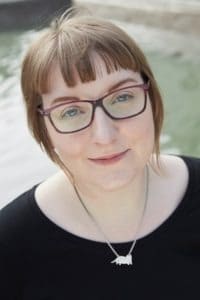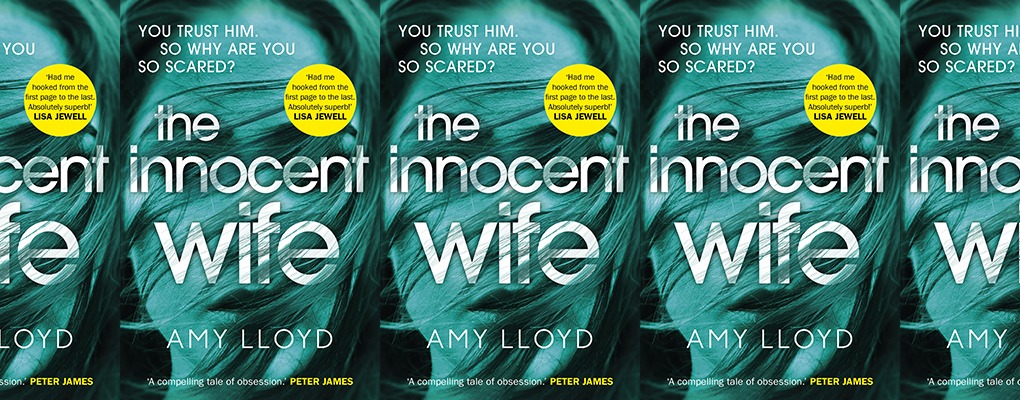Books
An interview with Amy Lloyd
Amy Lloyd is the debut author of The Innocent Wife, the gripping psychological suspense novel that blurs the lines between true crime and fiction.
Twenty years ago, Dennis Danson was arrested and imprisoned for the brutal murder of a young girl in Florida’s Red River County. Now he’s the subject of a true crime documentary that’s whipping up a frenzy online to uncover the truth and free a man who has been wrongly convicted.
A thousand miles away in England, Samantha is obsessed with Dennis’s case. She exchanges letters with him, and is quickly won over by his apparent charm and kindness to her. Soon she has left her old life behind to marry him and campaign for his release. But when the campaign is successful and Dennis is freed, Sam begins to discover new details that suggest he may not be quite so innocent after all.
We wanted to find out more about the book from the author herself.
 Tell us about The Innocent Wife…
Tell us about The Innocent Wife…
The Innocent Wife is about a man who was arrested and imprisoned for the brutal murder of a young girl in Florida’s Red River County, and a woman who falls in love with him whilst he’s on Death Row. She leaves her life in England behind to move to Florida, marry him and campaign for his release. But when the campaign is successful and her husband is freed due to DNA evidence, she finds herself miles away from home and anyone she knows, suddenly starting to wonder if he’s quite so innocent after all…
Where did the inspiration come from?
I watched the Paradise Lost documentaries and was entirely gripped by them. I spent hours after the last film finished just googling details of the case. There was such a huge response to the films online, which I found as interesting as the films themselves: people posted court transcripts and pored over evidence as if they too were detectives or lawyers. I’d never seen anything like it before. Of course, those Paradise Lost documentaries contributed to the eventual release of the three accused boys. Now men, they were all suddenly free after decades in prison. I wondered what that must be like, especially for Damien Echols (one of the so-called ‘West Memphis Three’) and his wife, who he had married whilst on Death Row. I thought about how it might feel for his wife; it could be a completely wonderful experience or, maybe, it would be awkward to be thrust together, so suddenly, no longer separated by a plastic divide in a prison visitation room.
I decided that it would be much more interesting if everything went horribly wrong, and if you couldn’t be certain that the man you were married to was really innocent or not.
What kind of research did you do?
Most of the research for this book happened organically. I read, watch and listen to a lot of true crime and this includes lots of memoirs and testimonies from men who have been on Death Row.
Florida seemed to be the perfect location for the book because of the oppressive heat and humidity, and I did some research on sinkholes because I liked the idea of setting it in a place where you are never sure what was happening just beneath the surface. I had been to Florida but hadn’t had the opportunity to visit the rural areas, so whilst I found it easy to imagine the atmosphere, I had to research the geographical landscape of the state to get an idea of what my town – Red River – might be like.
The book features a character, Dennis Danson, from a fictional true crime documentary. Do you watch, read or listen to a lot of true crime?
I’ve always been a huge fan of true crime. When I was a teenager, all I read were lurid paperbacks about serial killers like Jeffrey Dahmer and Dennis Nilsen. But true crime has evolved into something else, and nowadays it’s much less about the gory details of the crimes themselves, or getting into the mind-set of a killer, and more about enacting justice: we want to free the wrongly accused and see crooked prosecutors and law enforcement to account. We have become very virtuous and we like to gather en masse to enact social justice, especially on the internet. Jon Ronson’s book, So You’ve Been Publicly Shamed, gives some great examples of this.
This new wave of true crime takes the craving for justice to another level, and it also plays on our increasing mistrust of experts. Yes, there are corrupt prosecutors and police officers, and yes, there are false confessions and forensic investigations that are not always scientific. However, we are entering an era in which we will readily believe something we read online over the testimony of a professional, and true crime benefits from this greatly.
Even if the intentions of the filmmakers are honest, we can’t know what has been omitted from the hundreds of hours of courtroom footage they left on the cutting room floor. Making a Murderer was scrutinised for putting forward a biased representation of the case but this didn’t seem to matter to the viewers who wrote a petition to Barack Obama to pardon Steven Avery without the need for further investigation or trial.
It now seems we would like the opportunity to punish and release people based on how we feel, and that’s an interesting step backwards. The justice system is definitely flawed, but the alternative is frightening.
Had you always wanted to write?
I’ve always loved writing! Over the years I’ve picked up multiple musical instruments, tried drawing and painting, and quit them all. But I have always written. It’s hard because out of everything I’ve done it’s the most frustrating – I suppose because it matters so much to me that I’m good at it. It’s also the most rewarding when it goes right! There were moments when I was writing The Innocent Wife where, for maybe a page or so, my writing was exactly the way I wanted it to be. It was rare, but in those moments I was so happy because I was writing the book I wanted to read, and it felt amazing.
What was your writing process like? How did you fit it in around a job?
I write before work if I’m on a late shift and after work if I’m on an early shift. The key is not to let yourself stop because the minute you say, ‘I’m just going to watch ten minutes of Celebrity Masterchef…’ all is lost. Before you know it you’re on to your third hour of TV and calculating how long you can nap before your partner gets home. So never let your guard down – your brain is sneaky and will do anything to avoid writing.
What advice would you give to aspiring crime authors?
You have to be proactive to be creative. There’s a myth that all good ideas just sort of happen, that there will be a ‘Eureka!’ moment and a whole plot will form in your mind quicker than you can write it down. The reality is that you have to go looking for ideas. Be interested in everything because it will constantly feed your imagination. If you’re stuck on a plot point, you need to take a walk and think it over until you crack it. Just because you haven’t worked it all out in an instant, it doesn’t mean you don’t have a great idea. Keep working.
1 Comment
Join the discussion
Please note: Moderation is enabled and may delay your comment being posted. There is no need to resubmit your comment. By posting a comment you are agreeing to the website Terms of Use.


I thought the innocent wife was a ground breaking novel, mixing fact with highly inventive fiction.